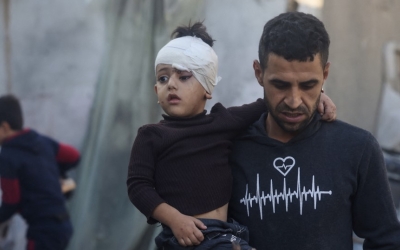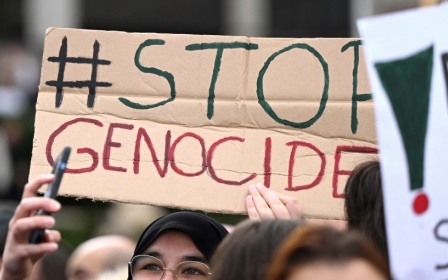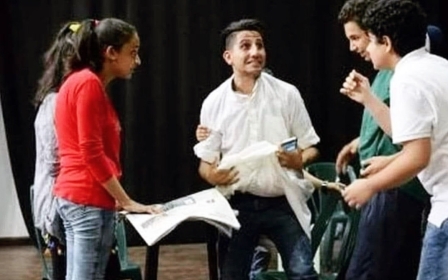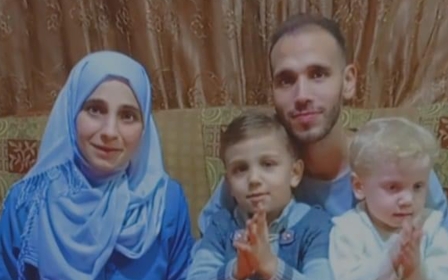War on Gaza: How Israel wiped out one family in a so-called 'safe zone'

On the 77th night of the Israeli bombing campaign on Gaza, Nariman Duhair woke at midnight to the jolt of nearby explosions rattling her home.
Nariman lives in Rafah, the Palestinian city designated a "safe zone" by Israel, but her family nevertheless found itself in Israeli crosshairs.
At a little past midnight on 22 December, her sister Mariam's brother-in-law called Nariman to inform her that Mariam's two-storey home had been bombed in an Israeli air strike.
Mariam Duhair, a 27-year-old mother of three, lives only one neighbourhood away from Nariman's house.
"The intensity of the bombing that night made it impossible for me to get to her house," Nariman said. "It was the most harrowing situation I've ever faced."
After waiting until 6am for news of her sister's fate, Nariman rushed to the hospital to check what had happened to her relatives. Her sister lived with 12 other relatives, including her own family and her in-laws.
"Her brother-in-law, who lives next to their house, told me that they found Mariam and her children thrown to the ground floor from the second floor due to the intensity of the bombardment," she said.
Nine people, including Mariam's husband, were killed instantly during the bombardment.
Neighbours prioritised saving those still alive before retrieving the bodies of the dead. Mariam and her children were taken to the nearest hospital, Abu Yousef Al-Najjar in southern Gaza.
'Mariam and her children [were] thrown to the ground floor from the second floor due to the intensity of the bombardment'
– Nariman Duhair
According to doctors, Mariam was conscious when she arrived but later fell into a coma.
"When I visited her, I had hopes that she was fine, but then realised the severity of her injuries," Nariman said.
"Her legs were amputated, and she sustained third-degree burns across her body. The burns affected her airway and trachea, impeding Mariam's ability to breathe.
"Exacerbating the situation, the hospital faced a shortage of oxygen cylinders," she said.
Later, Mariam was transferred to the Al-Emirati Hospital. There she came out of her coma and was asked whether she remembered the events of the past day.
She responded that she only remembered going to bed and then waking up in hospital.
Mariam fell into a coma again from shock after hearing about what happened to her children.
When Middle East Eye spoke to Nariman in late December, she had visited the hospital just an hour earlier. Doctors had given Mariam a 15 percent chance of survival and believed she would likely pass away the next day.
However, Nariman received the news of Mariam's death at the end of the interview.
Fate of the children
Mariam's three children were admitted to different hospitals, based on the seriousness of their conditions.
Shahd, aged seven, suffered a skull fracture, subarachnoid haemorrhage, and burns on her body. She was also struck by shrapnel, causing injuries to her liver and lungs.
After initially being taken to the Abu Yousef Al-Najjar Hospital, she was transferred to the European Hospital after undergoing surgery to her head. She remains hospitalised there at the time of publication.
"Doctors told us her wounds are not responsive to medications,” Nariman said, adding that the family had wanted her transferred to the Emirati Hospital, but this was impossible due to a lack of beds.
As Israeli tanks approach the European Hospital, there are fears that it will meet the same fate as hospitals in northern Gaza, which have been attacked and put out of service by the Israelis.
Shahd's younger brother Hamad, aged four, suffered third-degree burns and a pulmonary haemorrhage and was initially transferred to Abu Yousef Al-Najjar Hospital.
"When I visited his mum, I could not find him," Nariman said. "I feared he was a casualty of the shelling. But one of the doctors I follow posted his photo on Facebook, so I learned he had been transferred to the European Hospital due to the severity of his injuries.
"During my visit, I saw him screaming in agony. Unfortunately, Hamad succumbed to his injuries."
The children's youngest sister, Maysoon, who is eight months old, sustained burns on her face and a leg fracture.
Following the bombardment, Nariman left her house to a safer area and is now caring for the infant, who has been discharged from the hospital.
"Maysoon's mouth was burned, and she could not eat or drink for two days. Her hands are also burned, making it a challenge for her to interact with the world around her," Nariman said.
'The medications are expensive... a luxury we do not have at this moment'
– Nariman Duhair
Since leaving hospital the child has undergone a burn care routine. Because she was breastfed by her mother, she now needs to become accustomed to baby formula.
Neighbours have donated baby clothes, as all of the family's belongings were lost in the attack.
"The hospital does not supply medications; therefore, we are required to cover the costs of medications," said Nariman.
Nariman had to search pharmacies throughout Rafah city for the necessary medication.
"The medications are expensive, and her ongoing treatment requires a consistent supply, a luxury we do not have at this moment," she added, with Maysoon crying beside her.
Middle East Eye propose une couverture et une analyse indépendantes et incomparables du Moyen-Orient, de l’Afrique du Nord et d’autres régions du monde. Pour en savoir plus sur la reprise de ce contenu et les frais qui s’appliquent, veuillez remplir ce formulaire [en anglais]. Pour en savoir plus sur MEE, cliquez ici [en anglais].





